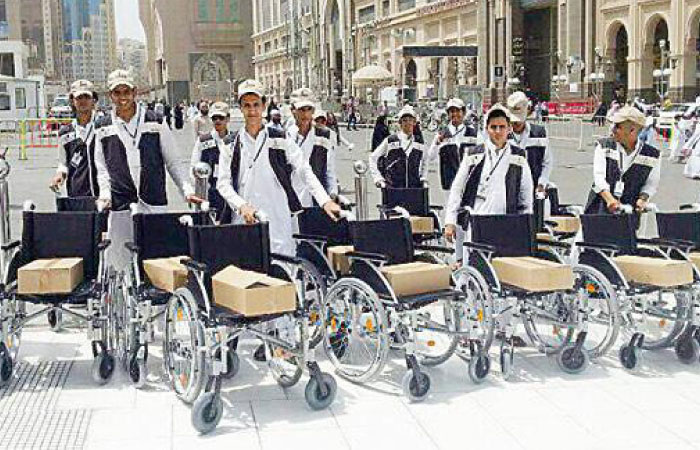
Wheelchair pushers of the Grand Mosque
MUHAMMAD Al-Sulami earns a living by pushing his wheelchair carrying the elderly and sick pilgrims in the Grand Mosque in Makkah. He has crossed millions of kilometers doing this tiresome but rewarding work in the past 20 years.
Old age will not deter him from continuing with the work. He still offers his services to pilgrims with a happy and friendly face and does his job efficiently and impressively.
The Presidency for the Affairs of the Two Holy Mosques provides some 12,000 standard wheelchairs for free. But it does not provide people to push the chairs, so visitors either manually power their chair or hire someone to push them.
Speaking to Al-Hayat Arabic daily, Al-Sulami said he and his colleagues walk several kilometers daily carrying pilgrims in their wheelchairs. “Every day I serve two or three pilgrims,” he said while waiting for customers in a queue with his colleagues at the Grand Mosque.
Al-Sulami is acutely aware of the difficult chore. In addition to the physical effort involved in pushing someone in the wheelchair, he faces all kinds of obstacles while cutting through the heavily crowded mataf and masa, where the pilgrims circle the Kaaba and walk between the mounts of Safa and Marwa as part of the rites of Haj and Umrah.
“Overcrowding is the most difficult problem we face while carrying out our job,” said Al-Sulami who wears a uniform like his colleagues. “We encounter problems with other pilgrims when our wheelchairs hit them but we solve the issues amicably,” he explained.
Al-Sulami said the job gave him an opportunity to meet with pilgrims from different parts of the world, some of who held important positions in their country. He considered the period from Ramadan to Dul Haj as the peak season when a large number of faithful visit the Grand Mosque for Umrah and Haj.
The interaction with pilgrims of different nationalities over the years has enabled Al-Sulami to speak different languages and this helps him in his profession.
Between his professional stints, Al-Sulami finds time to meet with his colleagues for small talk. They discuss various matters and exchange their problems and worries.
Al-Sulami said they welcomed newcomers to the profession and taught them how to handle various issues during work. Al-Sulami, however, does not know how the new electronic wheelchair would affect their age-old profession.
Sheikh Abdul Rahman Al-Sudais, head of the Presidency of the Affairs of the Two Holy Mosques, recently inaugurated the first phase of the project for distributing electronic wheelchairs designed according to international standards to sick and elderly pilgrims. The new wheelchair has been endorsed by the Saudi Standards, Metrology and Quality Organization (SASO) and Saudi Food and Drug Authority.
The move aims to replace old wheelchairs as part of efforts to modernize the presidency’s services to the guests of Allah.
The late King Abdulaziz, the founder of Saudi Arabia, had introduced special chairs for sick and elderly pilgrims in the Grand Mosque with two stout men to carry them.


























